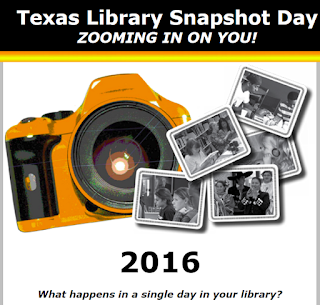By Laura Stiles
This post is adapted from her presentation at
the TASLA Workshop in June, 2016. She is Librarian at
Canyon Vista Middle School, Round Rock ISD; part-time reference librarian at
Austin Community College; a TALL Texan; past chair of TLA District 3; recipient
of ALA's Frances Henne Award. Laura has written articles for School Library Journal and Knowledge Quest. Follow her on Twitter at
@cvmslibrary.
Obtaining professional development as a librarian in Texas
is almost like being a kid in a candy store: with all that the Texas Library Association (TLA)
offers, what more could a librarian want?
Each year TLA presents librarians, library staff and volunteers with an
abundance of webinars, online training, District meetings, Round Table meetings
and, of course, our fantastic state-wide annual conference. “Annual,” as it is known, holds true to the
familiar saying, “Everything’s Bigger in Texas;” our state conference is bigger
than many national conferences. The more
than 7,000 attendees each year are treated to more than a thousand speakers and
hundreds and hundreds of vendors.
I tell people that attending TLA’s annual conference is like
being in a Choose-Your-Own-Adventure book.
Upon walking in, it’s decision after decision about which wonderful
thing to attend: see the latest furniture on the exhibit floor, or attend an
author signing? Hear from the recognized
expert about social media, or learn how to promote the latest hot titles? It’s a librarian’s adventure wonderland, and is
not to be missed.
However, this year I attended something new and so very
different: South by Southwest EDU (SXSWEdu). If one views attending TLA’s annual conference
as being akin to being in a Choose-Your-Own-Adventure book, one can argue that
attending SXSWEdu is like being in Willy Wonka’s Chocolate Factory. SXSWEdu was so unexpected, with so many
avenues for education and engagement, and surprises around every corner, much
like the Chocolate Factory.
The conference is built of many components but my experience
at the 2016 Conference can be generally broken down into two parts: the Playground and the Sessions.
THE PLAYGROUND
The SXSWEdu Playground is a casual area within the
conference center that offers hands-on presentations that highlight maker
activities, STEM vendors and activities, gaming, virtual learning, arts
integration and more.
At the same time that hundreds of enthusiastic conference
goers are (literally) trying their hands at merchandize and software like 3Doodlers,
Kahoot! and drag and drop programming, casual talks given by experts in a range
of subjects are being given. The speakers
use microphones but don’t expect a silent or still audience, and the seating is
made to be flexible and moveable. Speakers’ faces and presentations are
projected onto a big screen.
One riveting talk that I attended, “Sheriff Bus to Library:
How Kids Remix Social Good,” recounted the experiences of a group of teens and
adults that transformed a 1988 sheriff bus into a mobile library for use in
rural Guatemala. Another talk detailed
NOVA Labs’ latest games and videos created to promote scientific exploration, and
included information on how educators are using NOVA Labs as a learning tool in
classrooms nationwide.
THE SESSIONS
Like TLA’s Annual Conference, the sessions at SXSWedu differ
in duration and the level of audience participation; unlike Annual, SXSWEdu’s
sessions are primarily scheduled by community input via a tool called Panel
Picker. The sessions that receive the
most votes by the community-at-large are the sessions that are ultimately
presented.
Because such a diverse group of people attend SXSWEdu, and
because much of the content is chosen by popular vote, the programming is
diverse. According to the SXSWedu
website, of the almost 14,000 attendees at the 2016 conference, there were people
from thirty-eight countries representing government and non-profit agencies, public
and higher education, and a multitude of business and industry affiliates.
SXSWEdu divides the
conference sessions into tracks, which include the big trends that we would
expect to see at TLA’s Annual Conference, such as Early Learning, Leadership
and Continuing Education, as well as some less expected tracks, such as
Entrepreneurialism and Special Needs.
Each listing for a program is then tagged (sound familiar,
librarians?) into familiar categories, such as blended learning, digital citizenship, critical thinking, STEAM, tinkering and
more. But, SXSWEdu doesn’t stop
there – there are lots and lots of unexpected tags: things like design sprints,
behavioral economics, neuroplasticity, future trend mapping, upskilling, nutrition,
campus carry, edtech ecosystems and more.
One morning I found several sessions of interest that all
began at the same time: one, hosted by
the Bill and Melinda Gates Foundation, focused on how to negotiate barriers to
educational success. A second session
featured a panel discussing eliminating sexual assaults on higher-ed campuses; a
third session focused on education and peace in Afghanistan. The power of music in STEAM education was the
topic in another room. A film titled, “Oyler,” about educational
equality in an urban Appalachian neighborhood, was being screened at this time,
and conference keynote speaker Jane McGonigal was signing books then, too. Unfortunately, attendees can only be in one
place at a time. Maybe we should put
Willy Wonka to work on figuring out how to duplicate ourselves - ?
CLOSING
In Cinema
Revisited: the everlasting appeal of Willy Wonka and the Chocolate Factory (http://thetfs.ca/2016/02/01/cinema-revisited-everlasting-appeal-willy-wonka-chocolate-factory/),
Jordan Adler describes Willy Wonka’s dreams-turned-into-reality as
“complete with chocolate waterfalls, lickable wallpaper and labs filled with
Rube Goldberg-like contraptions.” While
SXSWEdu didn’t boast chocolate waterfalls or lickable wallpaper, there really was
a room filled with contraptions (remember the Playground?), and I wouldn’t have
been surprised to come across a fantastical element overflowing with ingestible
goodness or wall coverings that were edible.
I encourage you to attend both TLA and SXSWEdu. Just be prepared for a Wonka-esque experience
at SXSWEdu; to quote Willy Wonka, there are “surprises around every corner, but
nothing dangerous!” Hope to see you at
the Austin Convention Center March 6-9, 2017.
Just look for the librarian in the Oompla Loompa suit.




